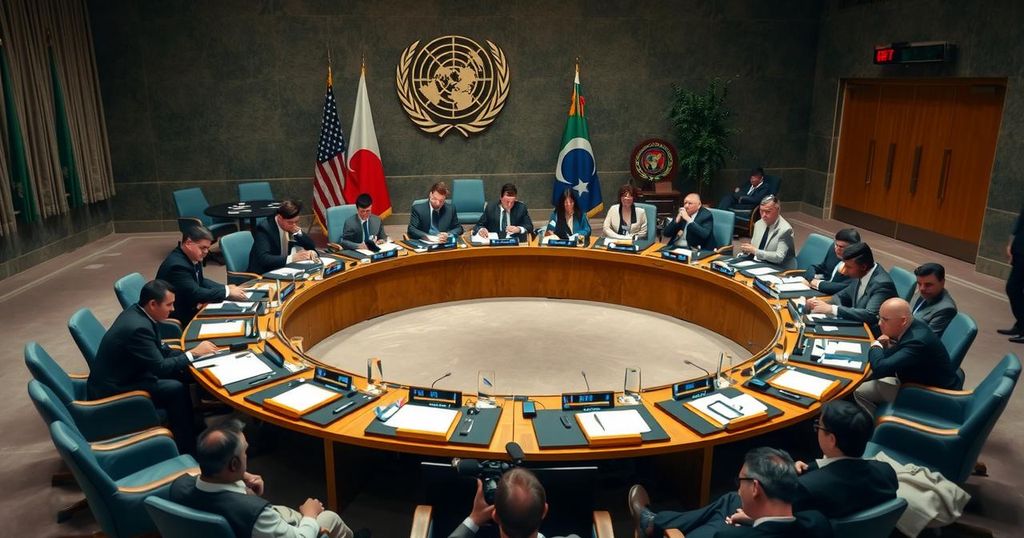The UN Security Council is convening an emergency meeting to discuss Israel’s airstrikes on Iran, which have heightened tensions in the Middle East. The Iranian government claims these actions threaten international peace. Meanwhile, Iraq has condemned the use of its airspace, and Egypt proposed a cease-fire in the Israel-Hamas conflict, highlighting the urgent need for humanitarian aid. Israeli airstrikes have recently resulted in casualties in Lebanon, reflecting the region’s escalating violence.
The United Nations Security Council is poised to convene an emergency meeting on Monday to address the escalating situation in the Middle East, triggered by Israel’s retaliatory airstrikes against Iran. Council President Switzerland confirmed that Iran has requested this meeting, supported by Algeria, China, and Russia. Iran’s Foreign Minister, Abbas Araqchi, articulated in a correspondence to the 15-member council that the actions of the Israeli regime present a serious threat to international peace and security, aggravating an already precarious situation in the region. The Israeli assaults, initiated early Saturday, reportedly engaged waves of airstrikes from Israeli jets targeting Iranian missile manufacturing facilities. This military escalation occurs in the aftermath of Iran’s missile attacks on Israel, in which approximately 200 ballistic missiles were launched amid ongoing hostilities with Iranian-backed groups, namely Hamas and Hezbollah, operating in Gaza and Lebanon. Iran’s Supreme Leader, Ayatollah Ali Khamenei, remarked on the situation, noting that the Israeli strikes should not be either overstated or underestimated, denying any immediate calls for retaliation. These actions mark a significant escalation as Israel undertook its first overt military strike against what it perceives as its principal adversary. In reciprocation, Israeli Prime Minister Benjamin Netanyahu asserted that these attacks successfully diminished Iran’s military capabilities and hindered its missile production endeavors. Additionally, Iraq has lodged a formal complaint with the United Nations, condemning Israel’s invasion of its airspace during the operations against Iran. An Iraqi spokesperson emphasized that the letter rebukes Israel’s violation of Iraq’s sovereignty. On the blend of ongoing hostilities and humanitarian concerns, Israeli forces have executed new airstrikes in southern Lebanon, resulting in casualties in the city of Tyre. Simultaneously, Egyptian President Abdel-Fattah el-Sissi has proposed a two-day cease-fire in the ongoing conflict between Israel and Hamas in Gaza, which would involve the release of four hostages by the militant group. El-Sissi’s initiative aims to alleviate humanitarian conditions in Gaza, which has suffered immensely during the conflicts. Following the turmoil initiated by Hamas on October 7, 2023, when they attacked Israel, resulting in approximately 1,200 fatalities and the capture of around 250 hostages, Israel has launched a counteroffensive leading to significant Palestinian casualties, reported to nearly 43,000 according to health ministry data that does not differentiate between combatants and civilians.
The situation between Israel and Iran has intensified following a series of violent exchanges that stem from longstanding regional tensions. The recent Israeli airstrikes against Iran were part of a broader conflict where hostilities have flared, particularly following Iran’s missile attacks on Israel. The United Nations Security Council’s involvement underscores the international community’s concern for regional stability and the need to address threats to peace in the Middle East. The dynamics of the ongoing Israel-Hamas conflict further complicate these tensions, making diplomatic interventions increasingly critical as humanitarian crises develop.
In summary, the UN Security Council will discuss Israel’s recent airstrikes against Iran amidst escalating regional tensions. The situation signifies a broader conflict where military actions are met with international concern and calls for reevaluation of humanitarian strategies. With Iraqi complaints against Israel and proposals for cease-fire from Egypt, it is clear that diplomatic dialogues are imperative to stabilize the increasingly volatile region. The consequences of these conflicts emphasize the necessity for immediate international attention and sustained efforts towards preventing further escalation.
Original Source: www.voanews.com






